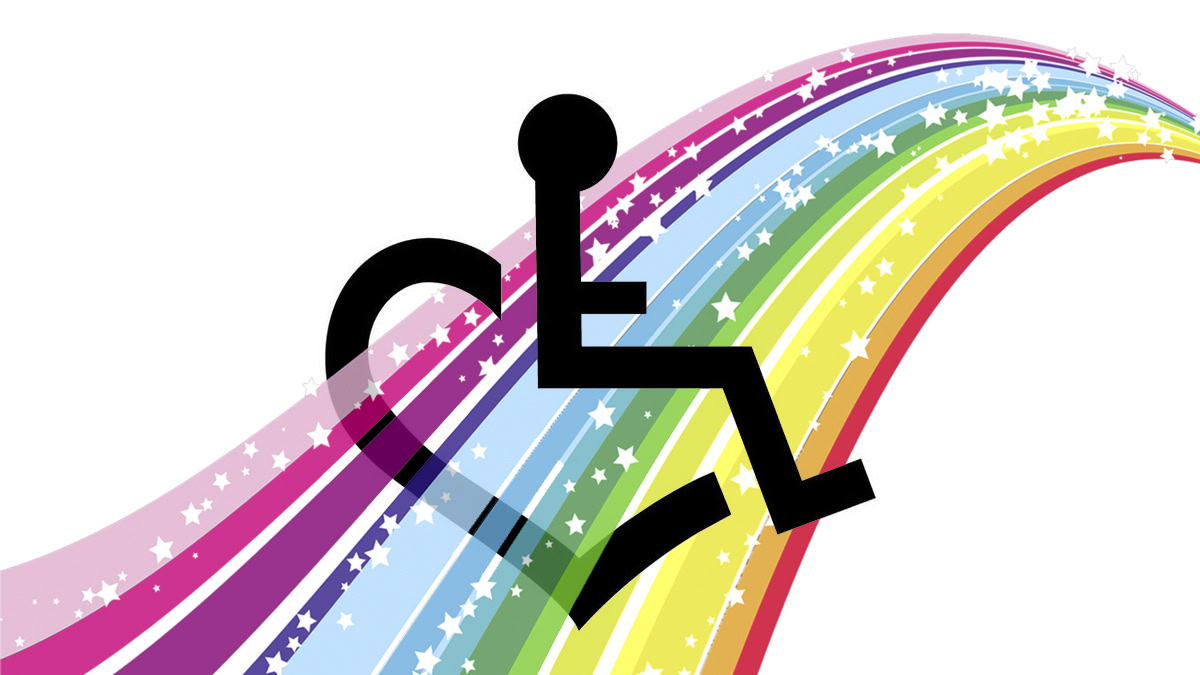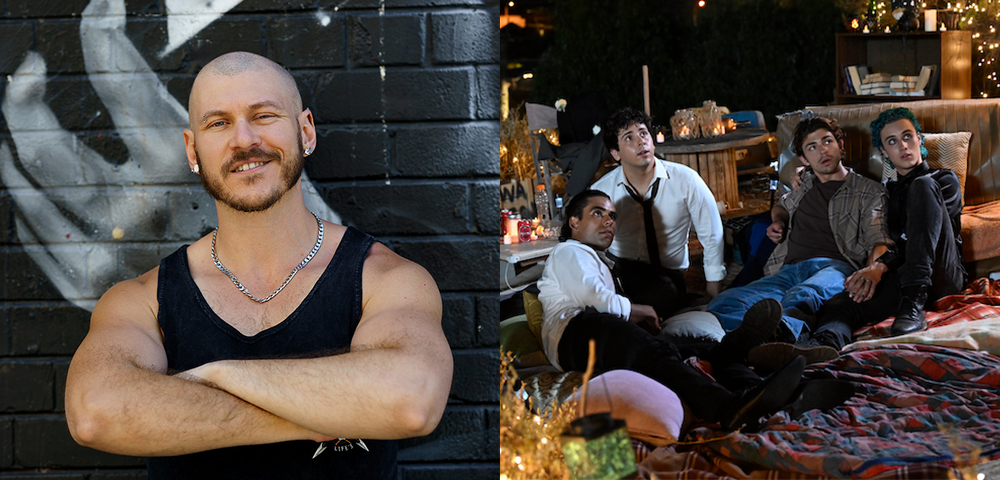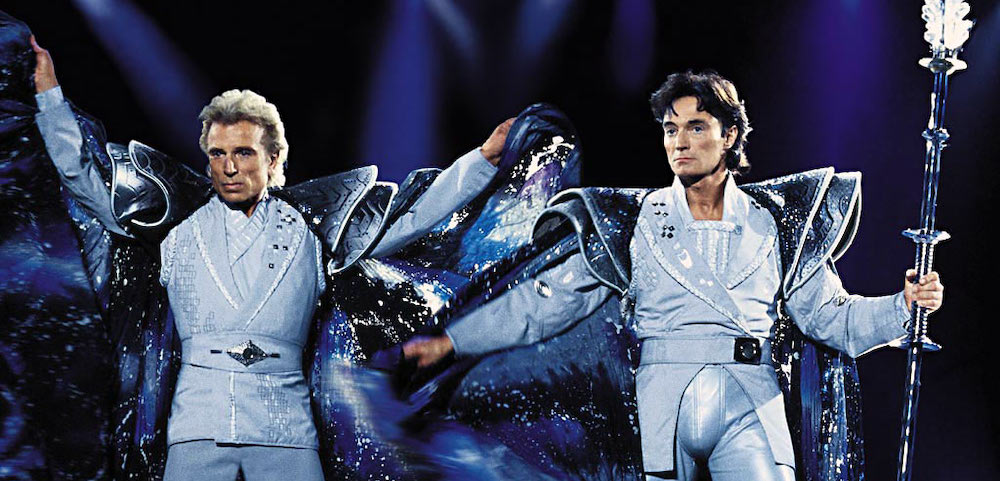

QUEER bars around Australia are meant to be safe spaces for young sexual and gender diverse people to explore their sexual identities, but for Thomas Banks they can become sites for rampant ableism.
In venues where able-bodied members of the LGBTI community can share an intimate moment without a second thought while busting a move to nineties-era Janet Jackson, Banks is often forced to consider how his mere presence is being perceived by those around him.
And in many cases, this perception is coloured by prejudice.
Born with mild cerebral palsy, Banks discovered his same-sex attraction as an adolescent when he caught himself checking out other men on the streets of Geelong.
As he grew older, he began to source sex and intimacy with other men in the dimly lit corridors of sex-on-premises venues, via hook-up apps, and over a drink in gay bars. However, these avenues didn’t always prove fruitful.
There were times when Banks would be kissing a handsome stranger he’d just met at a club when outsiders inexplicably stepped in and felt the need to intervene, assuming something must be inherently wrong with the situation.
“A few months ago when I was in Sydney I was hooking up with a guy but then his friends pulled him away from me and told security I was harassing him,” he said.
“The security guard pulled me aside and said ‘you can’t harass them’, so I had to talk to him so he understood what was going on.
“Their reaction was abusive, and it stemmed from a place of judgement.”
In the past men have slammed their doors in Banks’ face, refused to speak to him, and harassed him, and he believes the rationale behind a lot of these encounters is quite transparent: people make the inaccurate assumption that all people with disabilities don’t have sex.
“People don’t understand even today that I’m actually good in bed,” he said.
“They make these assumptions that queer people with disabilities don’t have sex – perhaps they think it might be too hard to do physically.
“And they think we’re not great at it, but we are. Just because I can’t communicate the same way doesn’t mean I’m not a good lover, or boyfriend, or fuck buddy.”
Banks believes many queer-friendly spaces and events in Australia could work on their inclusivity for the disabled community.
“We need more public events at things like Midsumma, and even in schools” he said.
“They could be more inclusive – there’s not enough conversation about it.”
***
Online porn often plays a role in shaping a young person’s understanding of sex and sexuality, and for
Jarrod Marrinon it became his outlet to safely chat with other same-sex attracted men.
There he could upload sexually-charged videos of himself to satiate the desires of others and flirt with users from around the world while being safeguarded from any prospective face-to-face vitriol or abuse.
Despite the geographic distance he’d placed between himself and those he was connecting with, he still faced ableism and discrimination from men that both reviled and revered his body.
“It was dangerous [back then] because it gave me a distorted view of what life was really like,” he said.
While his diagnosis is currently ambiguous, Marrinon believes his disability lies somewhere between Leukodystrophy, a virus that attacks the white matter in the brain, and cerebral palsy.
He identifies as bisexual and despite using male pronouns, often plays with the fluidity of gender by wearing nail polish and expressing himself in a genderqueer fashion.
When he was younger he joined a porn website that he likened to Facebook – if every user was naked and horny.
The men he found and sparked online trysts with often fell into two categories on the site: abusive or ‘devotee’.
The former would deride Marrinon for his disability while the latter would get off on it.
“A ‘devotee’ is someone who’s attracted to someone with a disability, purely because they’re disabled,” he said.
“My relationship with it is very complicated – I don’t mind if people find me attractive because of my wheelchair because I think it’s nice to be appreciated for who I am.
“But there were some ‘devotees’ that would get turned on by my limitations. One guy wanted me to put a glass on the ground and record myself struggling to pick it up.
“The idea of the guy getting off while I struggled with basic life wasn’t empowering at all.”
Using online platforms like this has seen Marrinon cop discrimination from a number of men, whether veiled as a fetish or not. But for those that are far more accepting, Marrinon said there’s still a lack of awareness around sex and sexuality when it comes to the disabled community.
“Online and in real life people are happy to make out or have sex but at the end of the night they generally don’t want to go home with me,” he said.
“There’s no discussion around what I can do in the bedroom and I don’t think people avoid asking questions because they don’t care, I think they just don’t want to know.
“If they think I might not be able to do something they’ll go to someone else they know can. People stick to what they know, and that can be really hard to push through. That’s why I’ve found it easier to have relationships with people with disabilities because that complication never needs to happen.”
To combat the barrier between able-bodied people and their understanding of sex and sexuality when it comes to disabled people, Marrinon believes sex education is key.
“They teach able-bodied straight sex to people with disabilities, even in special schools, and obviously never consider we’d be anything but straight,” he said.
***
There are a number of barriers to sexuality and relationship rights for people with intellectual disabilities according to Dr Patsie Frawley, senior lecturer in disability and inclusion at Deakin University.
An early problem contributing to the stigma around queer people living with disabilities can stem from those closest to them – family and carers.
Her research has found that parents and carers of people living with a disability who may be trying coming from a good place often don’t talk about sexuality in a positive light, if at all.
“Questions around autonomy when it comes to sexual expression is often not something that’s spoken about, and if it is it’s around restrictive approaches,” she said.
“When they do talk about it to their son, daughter, or client, it’s about all the things you can’t do – like that you can’t have a boyfriend over to stay.
“We find that a there’s a lot gatekeeping going on around information for disabled people around relationships and sex.”
Frawley runs a program around disability and sexuality with the aim of allowing those in the community to express themselves and share their life stories.
“People with an intellectual disability should be able to chat about things in their lives like sex and relationships and get their own information,” she said.
“What is currently out there is so narrowly focussed around the rules for what’s right and wrong for them.
“Our approach is to the life stories of people with disabilities. We’ve gathered them and use them for others to think about, talk about, and provide an important layer of discussion to the public dialogue.”
***
Much like browsing the titles in a library or bookstore, Ayman Barbaresco believes people only look at his ‘cover’, rather than the contents inside.
During his younger years he dealt with a number of medical complications including two brain tumours and a genetic disorder called Neurofibromatosis.
School was rough for Barbaresco, who was outed by one of his friends and subsequently subject to isolation in the classroom and in the schoolyard.
“It wasn’t until after school I was able to meet people, I travelled to Sydney quite a bit and that became my outlet into LGBTI culture,” he said.
However, due to his physical appearance he said many often don’t pay him a second glance.
“I’m only 147cm tall and I’m not fit or muscular, so because of that you don’t get looks in the gay community,” he said.
“They don’t talk to you. They just think ‘oh, whatever, he isn’t that tall’, and they haven’t even gotten to know me yet.”
When it comes to sex, Barbaresco believes some gay or bisexual men are worried when it comes to getting between the sheets with a disabled person.
“I think people are worried if they do something wrong they might hurt someone with a disability,” he said.
“Or they might not know what to do if I need to go to the doctor, or need an ambulance.
“It’s a lack of awareness – sure, I’ve got faults but I am human after all and I am just as worthy as anyone else.”
Barbaresco added that people in the community need to start a conversation with the people they encounter living with disabilities.
“Have discussions with us because you’ll find we’re pretty awesome people,” he said.
“I have a heart so why am I looked at differently, I’m no different to the guy you swipe right with on Tinder.”
***
Ad’m Martin at times feels he’s more accepted as a gay man in the disability community than as a disabled man in the gay community.
The fear of being faced by homophobia and ableism from other queer men has weighed heavily on him in the past, compelling him to rapidly cut himself off from the possibility of intimacy or relationships.
“Sometimes I’m confused as to whether I do get that discrimination from other men or if I do it to myself. I’ve suffered with my own internalised fear,” he said.
Martin, who describes himself as the ‘pink sheep’ in his family, has lived with a neurological and neuromuscular condition his entire life. He was diagnosed as a teenager, around the same time he came out as gay and became afflicted with issues around mental illness.
He believes the media and proliferation of able-bodied, cis white men being championed as the beauty standard within the LGBTI community need to be challenged, as a means to foster a more inclusive environment for disabled people.
“We don’t talk about the things we do to ourselves,” he said.
“You see gay men that are going to the gym four times a week everywhere, and we [disabled people] don’t tend to fit in anywhere.
“When was the last time you saw a wheelchair user on the front cover of DNA Magazine?”
There are many who hold unfair misconceptions around what queer people can and can’t do in the bedroom, and Martin said it can be really disheartening.
“I can be chatting to someone online and be getting along with them on an intellectual level, but when I mention my wheelchair everything seems to change,” he said.
“Sometimes I think I should join a nunnery when it comes to sex – I think some guys are too afraid and don’t think I can do it.”
Martin firmly believes that increased visibility is the key to ending the stigma surrounding people with disabilities and their sexual identities.
He tries to lead by example and hopes that if areas like public spaces, transport, and information can increase their inclusivity and accessibility, the rest will follow suit.
“I’m here, I’m queer, and I’ve got wheels – my presence is undeniable.”
Star Observer feels passionately about members of our community that are underrepresented. If you’re living with a disability and fall under the LGBTI umbrella, we’d like to hear your story. Send an email to matthew.wade@starobserver.com.au.









